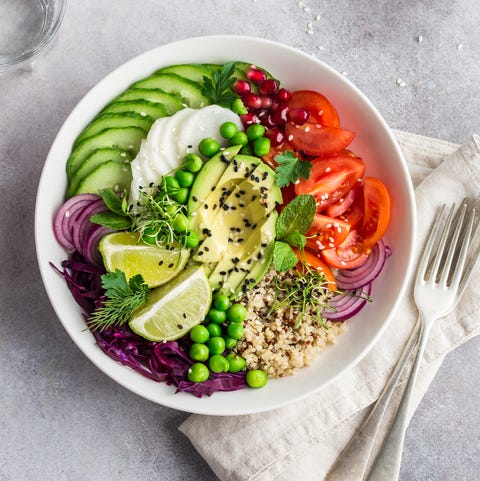"If God made it, eat it; if man made it leave it."
"Most people aren't getting enough fruits and vegetables [to increase fibre intake, at least 24 to 35 grams daily]. That ]sufficient daily fibre intake] has many health benefits, including heart health and reduction of cancer, especially colon cancer."
"Beans are nature's superfood. They have protein, they have fibre, they have starch. Beans have been a staple in diets across the world, and beans have shown so many health benefits, including a reduction in cancer risk."
"If you are low income, I'm not sure that you can afford to buy the foods that he's [author Mark Hyman of the 'Pegan' diet] suggesting. [Since the Pegan diet prescribes] 'organic', 'sustainably grown', 'pasture raised', 'grass fed' food."
"The first' pro' of going on any sort of diet is you are now starting to think about your food. You are prepping in advance. You are controlling your portion size. You're not just running out and grabbing fast food or just shoving anything in your mouth because you're hungry."
"To me, we should always be doing that [being aware]."
Wesley Delbridge, Child & School Nutrition Expert, Professor of Food Science, spokesman, Academy of Nutrition and Dietetics, Phoenix, Arizona
"I do think that we're not eating enough plants, fruits and vegetable and getting the fibre in. I think for people who like the plant-based way of eating, but feel overwhelmed and can't completely commit to a plant-based diet, this gives them some options."
"I prefer to not have everyone follow a specific diet, because that puts them in a black-or-white position: They're either following the diet or they're not."
"Promoting heart-healthy fats and increasing plant-based eating are such good pros, but understand that you can increase those foods without going down the diet path, so you don't get trapped in the diet mentality."
Christine Fitzgerald, registered dietitian, Chicago
 |
| Breaking Muscle |
The latest trending diet: "Pegan". At its core a diet based on plants, supported by research showing its value for personal health as well as environmental health. A variety of richly coloured fruits and vegetables are to represent the makeup of roughly 75 percent of the diet. Which leads dietitian Christine Fitzgerald to remark: "What if you don't like berries. We can do other things to reduce the impact on blood sugar, like pairing fruit with protein".The pegan diet combines some principles of the paleo diet and veganism and prescribes a plant-based eating style. Followers eat vegetables, fruits, nuts, seeds, meat, fish, and eggs and avoid dairy, grains, legumes, sugar, and processed foods.
But also on the diet is a prominent need for fatty fish and flaxseed, as sources of omega-3, a vital dietary element people frequently overlook in their diets. Nuts, avocados, olives and health-proven oils to provide healthy unsaturated fats are also part of the diet which does give some leeway for grass-fed or sustainably-raised meat, butter and ghee, as well as organic coconut oil and coconut butter.
And there you have it, the vital diet for the thinking person concerned about the state of their personal health and with an eye cocked toward having as little impact on the environment as possible, in the process. But whereas most ordinary non-diets consider animal products the most important part of daily food intake, the Pegan diet gives meats "condiment" status; an afterthought so to speak, suggesting alternatives such as fish and other seafood harbouring low-end mercury levels.
Beans, according to this diet plan and its allowables, should be eaten only "once in a while", limited to 1/2 cup daily. Foods with added sugars should be limited to occasional treats. Foods to be avoided are those susceptible to pesticide residues, antibiotics, hormones, genetically modified ingredients, chemicals, additives, preservatives, artificial colourants, MSG and artificial sweeteners. According to its proponent Mark Hyman: "If God made it, eat it; if man made it leave it."
Also prohibited is wheat and other gluten-containing grains, though occasional intake of the ancient wheat einkorn appears permissible. The diet author makes the claim that most wheat is a genetically modified "Franken-wheat" while the fact is that countless varieties of heirloom wheat are available, along with emer, spelt and einkorn. Gluten-free grains like quinoa, brown rice, oats and amaranth are given limited status on the claim that they raise blood sugar and can trigger autoimmunity (absent the science to support the latter, and the fact that all carbs raise blood sugar).
Where once the advice was to avoid all dairy on a claim without research support that for most people dairy contributes to a number of chronic diseases, the diet now permits occasional yogurt, kefir, butter, ghee or cheese with a preference for goat or sheep milk; always organic and grass-fed. Many nutrient-rich foods are restricted.
 |
Getty ImagesAnna_Shepulova
|
Labels: Bioscience, Diet, Health, Nutrition

0 Comments:
Post a Comment
<< Home